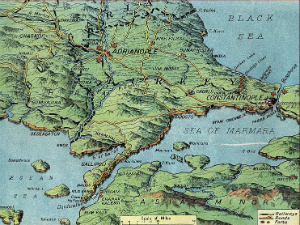The Geopolitics of the Middle East Crisis |
| Friday, 26 February 2016 |
|
Colin Gray, one of the most important strategic thinkers of the 19th century, wrote that geopolitics deals with “the important and enduring, as opposed to the trivial and the transient”. The ongoing crisis in the Middle East has shed a light on some “important and enduring” traits of international politics that “trivial and transient” ideological blindness has kept hidden for a long time. Russia and Turkey have been at war twelve times throughout history; the first time being in 1569 over the Khanate of Astrakhan. In the 17th and 18th centuries, the two countries were at war on an average of every 25 years, and in 1877 Russians were a step away from achieving their historical dream: the conquest of Constantinople, also known as Tsarigrad in Russian, the Tsar’s city. For Russia, the control of Constantinople was crucial in creating a route between the Black Sea and the Mediterranean Sea; from this perspective the connection between Crimea and Syria today is clearer. The Bosporus and Dardanelles straits would allow Russia continual navigable sea access, writing a fresh new chapter in her history. It is, in fact, the lack of year-round navigable waters that has kept Russia from becoming a superpower, by slowing its economic exchanges and also by compromising its military activities. Nowadays, however, it seems out of place to speak about Russia’s will to become a superpower. The conditions are missing: the falling oil prices, the ruble crisis and the international sanctions placed on Moscow do not improve her short- or mid-term perspectives. Nevertheless, because of their history and traditions, the Russian elite tend to care more about what is important and enduring. In other words, it has a geopolitical vision of the world that many of its competitors lack because of their trivial and transient concerns. This does not mean that we will soon face a thirteenth Russian-Turkish war, or that Putin has in mind to conquer Istanbul. It means, instead, that when important and enduring matters are at stake, Russian and Turkish interests collide. But this is not the only important and enduring feature that the Middle East conflict has revived. A geopolitical rivalry between Turkey and Iran has also begun to arise again. In terms of longue durée, this rivalry is much more deeply rooted in the past than that of the Russian-Turkish rivalry since it has been inherited from the conflict between the Persians and Greeks; Ottoman Turks being the latter’s geopolitical heirs. The most ancient of those wars goes back to the 5th century BCE, two thousand years before the first war between Turkey and Russia. The heart of the conflict between the Greek-Turkish world and the Persian world was Mesopotamia. The second to last event of that conflict was the conquest of the Tigris and Euphrates plains by Suleiman the Magnificent in the 16th century, which constituted the climax of the Ottoman Empire and the beginning of the downfall of the Persian Safavid Empire. The last leg of this long-lasting conflict was the return of Iran to Mesopotamia following the Saddam Hussein’s fall and the rise to power of the pro-Iranian faction’s in Baghdad. Even the Turkish and Iranian elite have a geopolitical point of view about international relations. The extraordinary economic growth and the rapid democratization of the country in the first decade of the 21st century had led Ankara to undertake a course of action that was soon labeled as “Neo-Ottoman.” This “Neo-Ottoman” vision aimed at reestablishing the ancient Balkan, North African and, especially, Middle Eastern connections of the empire that fell one-hundred years ago. On the other hand, Iran, after the pathetic failure of Khomeini’s pan-Islamist project and because of the American intervention in 2003, turned again toward his traditional area of interest: Mesopotamia and the Greater Syria. Those who claim that after the end of Khomeini’s (and Ahmadinejad’s) era the Tehran ruling class is today more Persian than Muslim are not entirely wrong. For its part, the European Union does not and cannot have a geopolitical point of view of its external relations because of its short historical background, and since it lacks a continental common interest. Today, the EU is composed of 28 different, and often opposite, national interests, and it has more than 28 different geopolitical traditions. This could lead to a situation where the German chancellor travels to Istanbul to blame the Russians, while in Paris the voices favorable to a crucial role of Russia toward a resolution in the Syrian crisis are always more audible. Given the fluctuating historical relations of Germany and France with Russia, it is quite possible that Berlin and Paris interchange positions tomorrow. But today it is difficult not to think of the August 1914 alliances. Yet, geopolitics is not fatalism. Dealing with the important and the enduring is essential. This does not however, prevent from making disastrous decisions. Thus, the fact that Russia’s, Turkey’s and Iran’s resolve has been set by their geopolitical vision will not prevent them from paving their way to hell. This article was published in Italian on the news website La Voce di New York on February 11th, 2016: see here. |

 By Dr. Manlio Graziano, Assistant Professor of Geopolitics and Geopolitics of Religion at AGS
By Dr. Manlio Graziano, Assistant Professor of Geopolitics and Geopolitics of Religion at AGS

 For me, a key attraction of AGS was the opportunity to complete two Masters’ degrees in two years in two languages.
For me, a key attraction of AGS was the opportunity to complete two Masters’ degrees in two years in two languages.